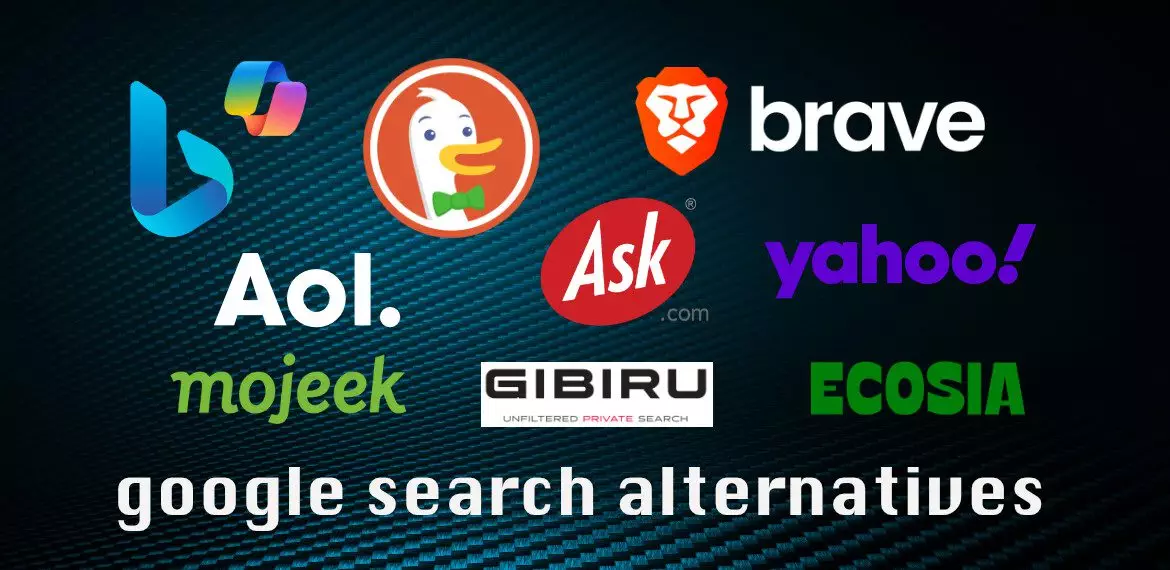 Aug
10
Aug
10
Maybe it’s time to look at some alternatives to Google Search.
- August 10, 2024
- 0 Comment(s)
Many feel that Google hasn’t being playing fair in the past years, and has become a monster in its industry. This is the message coming from the U.S. Department of Justice, where a federal judge recently ruled that Google illegally monopolized the online search and advertising field through it long-standing partnerships with tech giants like Apple and Samsung.
Google, of course, disagrees with this decision, and has indicated that it will be appealing this decision. But given the possible final ruling, maybe it’s time to consider how dependent many have become on Google Search, and possibly consider some worthy alternatives. In 2024, we don’t have “google” anything – there are quite a few good options to choose from, some with some serious privacy benefits.
Why change from Google Search?
Google has been the premiere search engine for some time now, because it’s fast, easy to use, and integrates heavily with other Google Apps, such as YouTube, Gmail, and Google Docs. Due to partnerships with Samsung and Apple, the Google Search Engine has become the default option on most mobile devices. Google’s parent company, Alphabet Inc., paid Apple $20 billion in 2022, for example, to make Google Search the default search engine for the Apple Safari browser on iPhone, iPad, and Mac. This is where the Justice Department’s argument for a monopoly begins.
In addition, Google has decades of documented privacy concerns, personal data mining, and search results that aren’t always what you are actually looking for. As a result, Google probably knows more about you than any other company, with the exception of social media platforms that we willingly upload every detail of our lives, and it uses that knowledge to serve you the ads it thinks you are more likely to click on.
With this incredible amassing of your personal data, Google wields incredible power – and has become the target of lawsuits in both the U.S. and European Union for that very reason. These concerns have been very public, and it shows – some of the most recent popular search trends show a rapid interest in privacy protection, and Google Search alternatives.
What Search Engines prioritize User Privacy?
 One of the oldest privacy-focused Search Engines is DuckDuckGo. DuckDuckGo was founded on the premise that relevant search results DO NOT require an exchange of Persoanl Data. DuckDuckGo does not track user searches, and does not store your data to build a profile on the user. The search interface is very clean and straightforward, and it presents the results with clear listings, with filters for region, data, and other criteria.
One of the oldest privacy-focused Search Engines is DuckDuckGo. DuckDuckGo was founded on the premise that relevant search results DO NOT require an exchange of Persoanl Data. DuckDuckGo does not track user searches, and does not store your data to build a profile on the user. The search interface is very clean and straightforward, and it presents the results with clear listings, with filters for region, data, and other criteria.
DuckDuckGo also offers easily filtered searches for news, images, video and other types of results, similar to Google, but with privacy being the key focus of the engine. It even provides a paid upgrade to gain access to a built-in VPN, and to remove older personal information from data broker sites that sell your info, and also identify identity theft restoration, if you need it.
 Brave Search is another privacy-focused search engine option. Coming from the innovative creators of the privacy-focused Brave web browser, Brave Search claims “unmatched privacy.” Using the EFF’s Cover Your Tracks Tools, Brave was found to be the most private browser, so the claim has some weight behind it. Brave gets its results both from its own web crawling index and “anonymous API calls to third parties.” Brave now gives you a choice of AI-powered or standard web results via its Answer With AI button. A Discussions section on the result page features content from Reddit and the like. Finally, Brave’s Goggles feature lets you filter your results with parameters like No Celebrity content or News from the Left or Right.
Brave Search is another privacy-focused search engine option. Coming from the innovative creators of the privacy-focused Brave web browser, Brave Search claims “unmatched privacy.” Using the EFF’s Cover Your Tracks Tools, Brave was found to be the most private browser, so the claim has some weight behind it. Brave gets its results both from its own web crawling index and “anonymous API calls to third parties.” Brave now gives you a choice of AI-powered or standard web results via its Answer With AI button. A Discussions section on the result page features content from Reddit and the like. Finally, Brave’s Goggles feature lets you filter your results with parameters like No Celebrity content or News from the Left or Right.
The downsides of using private search engines are minimal; without any personalized tracking, these engines results may be slightly less relevant to you personally. With this less invasive approach, these engines are seeing massive growth and adoption over the past few years.
 What’s the most attractive or Visual based Search Engine?
What’s the most attractive or Visual based Search Engine?
If you are looking for visual and eye-popping results, you may want to consider Bing. Microsoft’s search engine prioritizes high-quality imagery, videos, and adds pop-up tools, and visual aids into its results pages. The layout is somewhat traditional, but it has more of a Instagram or Pinterest feel when displaying images and videos.
Bing  promotes search suggestions and offers larger previews of news stories, Wikipedia entries, and other results front and center.
promotes search suggestions and offers larger previews of news stories, Wikipedia entries, and other results front and center.
Bing also was one of the very first search engines to embrace Artificial Intelligence, and gives access to Microsoft’s Copilot AI to help answer questions and pull data from the web, providing summaries of topics front and center.
Bing does not promise the same privacy protection as DuckDuckGo or Brave, as it also gathers data that links to your Microsoft account, to allow it to personalize results and present ads.
 What about Yahoo!?
What about Yahoo!?
Yahoo and Google were once involved in a long and heated search engine competition, but those days are long gone. Yahoo! is still one of the most-visited sites on the internet, and its search is still powerful. Powered primarily by Bing, the results are similar to what you’ll see on Microsoft’s search site, which means they’re pretty good.
You might wonder why you’d use Yahoo! at all if it leverages Bing, and that’s a great question. Yahoo! isn’t just a search engine, of course; all of the added features and tools are the real draw here. Yahoo! is kind of like Facebook versus Instagram, and is still a one-stop shop for many internet users who aren’t keen on the Google ecosystem. But Yahoo! Search has become somewhat dated – and gets few updates and regular changes.
Does anyone still use AOL Search? of Ask?
AOL is still alive and kicking as a favorite search engine of its prior users, though under the same company as Yahoo!, and nowhere near its old glory days either. Its interface is slick and clean, like Yahoo!’s, with an option to filter potentially offensive results. The image search filters are top-notch but not as good as Google’s. Privacy is not its strong suit, though; location and activity tracking are turned on by default, so be sure to toggle those off if you want to fly under the radar.
is still alive and kicking as a favorite search engine of its prior users, though under the same company as Yahoo!, and nowhere near its old glory days either. Its interface is slick and clean, like Yahoo!’s, with an option to filter potentially offensive results. The image search filters are top-notch but not as good as Google’s. Privacy is not its strong suit, though; location and activity tracking are turned on by default, so be sure to toggle those off if you want to fly under the radar.
 Older internet users can probably remember when Ask Jeeves, now known as Ask.com, was an amazing search engine, and ahead of its time. Today,while it’s not nearly as revolutionary as it was two decades ago, it’s still worth considering as a stand-in for Google. This search engine works best when you ask a question but produces results like other search engines in an instantly familiar list format. It does occasionally produce a completely random search result that is prioritized higher than relevance – this seems to be due to farming its search functions to third party providers that can heavily seed the search results with paid placements.
Older internet users can probably remember when Ask Jeeves, now known as Ask.com, was an amazing search engine, and ahead of its time. Today,while it’s not nearly as revolutionary as it was two decades ago, it’s still worth considering as a stand-in for Google. This search engine works best when you ask a question but produces results like other search engines in an instantly familiar list format. It does occasionally produce a completely random search result that is prioritized higher than relevance – this seems to be due to farming its search functions to third party providers that can heavily seed the search results with paid placements.
What are some of the newer interesting Alternatives to Google Search?
Here are three specific niche sites that you can use to begin a web search – each with a different unique approach.
 Sustainability focused Search site Ecosia plants trees in environmentally sensitive areas when you use it, and it promises to protect your privacy.
Sustainability focused Search site Ecosia plants trees in environmentally sensitive areas when you use it, and it promises to protect your privacy.
 Giburu is another new alternative that prioritizes privacy. According to Gibiru, there is no activity tracking, ads or agenda to follow you around the internet.
Giburu is another new alternative that prioritizes privacy. According to Gibiru, there is no activity tracking, ads or agenda to follow you around the internet.
 And if you are seeking an emotionally connected search, take a look at UK-based Mojeek. It claims that it doesn’t track you or sell your data, but the really interesting part is that it lets you search based on an emotion. Type in your query and click on an emoji-like icon such as a heart for “love,” a laughing face for “haha,” and a surprised face for “wow,” among others. It’s interesting but still super-niche, and it looks like an early iteration of an idea versus something worth switching to right now.
And if you are seeking an emotionally connected search, take a look at UK-based Mojeek. It claims that it doesn’t track you or sell your data, but the really interesting part is that it lets you search based on an emotion. Type in your query and click on an emoji-like icon such as a heart for “love,” a laughing face for “haha,” and a surprised face for “wow,” among others. It’s interesting but still super-niche, and it looks like an early iteration of an idea versus something worth switching to right now.
When considering alternatives to Google Search, these options are a great place to start. Each has its strengths and weaknesses, and may have a specific reason to appeal to you, the user. In 2024, there are many options – and it really depends on each users personal preferences.


